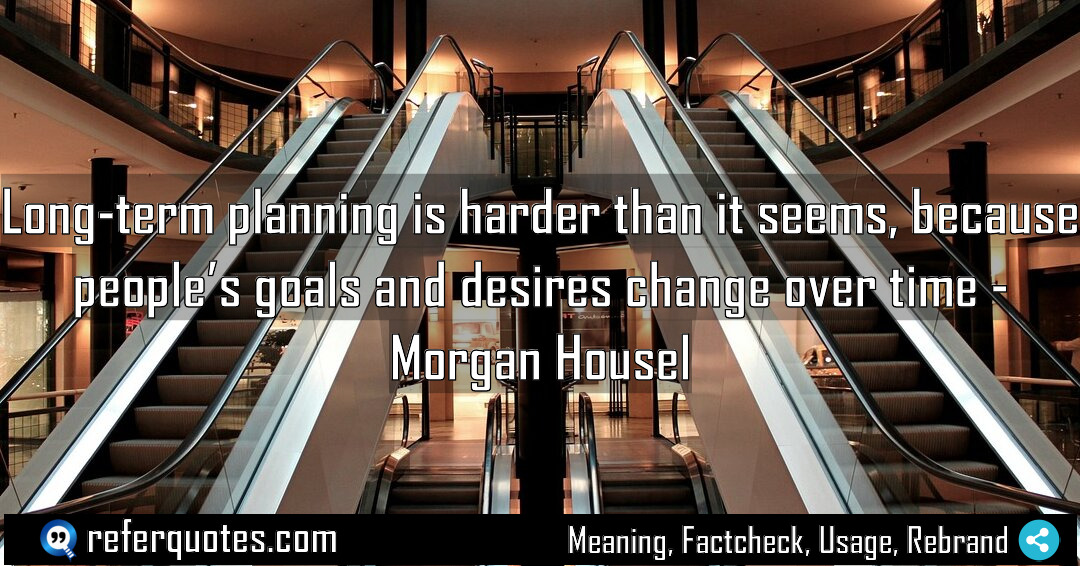
Long-term planning is harder than it seems because our goals are a moving target. We think we’re planning for a future version of ourselves, but that person is constantly changing. It’s a fundamental flaw in how we approach big life decisions.
Share Image Quote:
Table of Contents
Meaning
The core idea is that we consistently underestimate how much we, and our priorities, will evolve. We make rigid plans for a person who won’t exist in ten years.
Explanation
Look, here’s the thing I’ve seen over and over. We sit down with a spreadsheet or a vision board and we chart out the next 20 years. We’re planning for the person we are *today*. But that person? They’re temporary. A promotion, a health scare, kids, a new passion—life happens. And it changes what you value. The goal you were so fiercely chasing at 25 might feel utterly meaningless at 40. The real challenge isn’t the planning itself; it’s accepting that the plan must be flexible enough to accommodate the person you are becoming. It’s about building a system, not just following a map.
Quote Summary
Reading Level60
Aesthetic Score60
Origin & Factcheck
This quote comes straight from Morgan Housel’s fantastic 2020 book, The Psychology of Money. It’s a US publication, and it’s all his—no misattribution here. He really nails the behavioral side of finance.
Attribution Summary
Where is this quotation located?
| Quotation | Long-term planning is harder than it seems, because people’s goals and desires change over time |
| Book Details | Publication Year: 2020; ISBN-10: 0857197681; ISBN-13: 978-0857197689; Pages: 256 (approx.) |
| Where is it? | Unknown chapter / page |
Context
In the book, Housel uses this to explain why so many financial plans fail. We save for a retirement we can’t yet envision, we buy houses for lifestyles we might not want later. He argues that accepting the inevitability of change is a more powerful tool than any rigid investment strategy.
Usage Examples
You can use this as a reality check in so many situations.
- With a young, ambitious employee obsessed with a 5-year career track. Tell them: “Your plan is great, but hold it loosely. The opportunities that will truly excite you in three years probably don’t even exist on your radar right now.”
- For someone stressing over a 30-year mortgage. Remind them: “You’re not locking in a life, you’re locking in a payment. Your life inside that house will change a dozen times. The plan is just the container.”
- In personal goal setting. I use it myself. I set direction-based goals (e.g., “improve my health”) instead of specific, brittle ones (“lose 20 lbs by June”). It allows for adaptation.
To whom it appeals?
Share This Quote Image & Motivate
Motivation Score55
Popularity Score60
Shareability Score65
FAQ
Question: So should we just not plan at all?
Answer: No, that’s the wrong takeaway. The power is in planning with humility. Plan for the near-term with conviction and the long-term with principles and flexibility. It’s the difference between a rigid, detailed map and a reliable compass.
Question: Does this mean long-term goals are pointless?
Answer: Not at all. Long-term goals provide direction. But you have to be willing to reroute. The goal is the destination on the horizon, but the path you take to get there will almost certainly change.
Question: How does this apply to investing?
Answer: It’s huge. People create an investment policy statement at 30 and think it’s set in stone. But your risk tolerance, your income, your family needs—they all evolve. The best investors regularly check in and ask, “Does this plan still fit the person I am now?”
Similar Quotes
If you want long term results, you need to understand that plans are just blueprints. The real, lasting success comes from investing in the people who will bring those plans…
You know, “Excessive planning is a form of procrastination” hits you differently when you’ve been in the trenches. It’s not about ditching plans, but about recognizing when your planning becomes…
Every plan is only as good as your ability to stick to it when things go wrong. This is the brutal truth about strategy that most people ignore. It’s not…
You know how we make plans assuming best-case scenarios? That’s the planning fallacy in a nutshell. It’s why we’re always running late and projects blow past deadlines. We’re wired to…
You can’t buy your way to longevity; it’s a truth that flips our entire modern approach to health on its head. We’re so conditioned to think we can purchase a…
